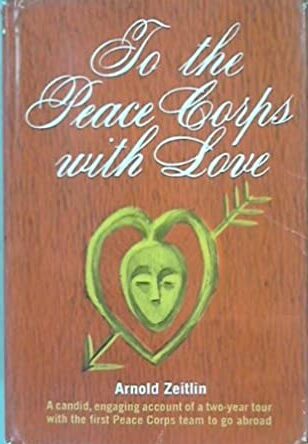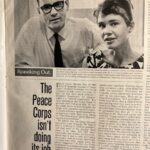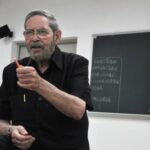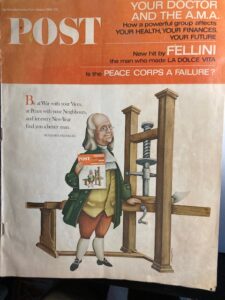Author of the first Peace Corps memoir | Arnold Zeitlan (Ghana)
Arnold Zeitlan (Ghana 1961– 63) was a correspondent for more than 30 years, and bureau chief of The Associated Press, assigned to West Africa, Pakistan, Bangladesh, Afghanistan and the Philippines. For UPI, he served as vice president and managing director of the Asia-Pacific division, based in Hong Kong. From 1998 to 2001, he served as director of the Asian Center of The Freedom Forum, a nonprofit foundation devoted to news media issues. In 2001, he founded Editorial Research and Reporting Associates, Inc., which consults news media and journalism educators primarily in Asia in support of the First Amendment to the U.S. Constitution. He has lectured and taught at Yale, Boston and Northeastern universities.
Before this newspaper career, Arnold was a PCV in Ghana!
•
The Peace Corps was very new when you joined. Why did you join?
I have few heroes but one of them was Ed Murrow. In 1961, he left his six-figure job at CBS to join the Kennedy administration as head of the U.S. Information Service for $25K a year. I thought I would follow a similar path. I applied to the newly announced Peace Corps, for which I thought I would make a splendid PR guy.
I was then the TV columnist for the Pittsburgh Post-Gazette and had just been turned down for a raise in pay.
I took the first national Peace Corps test and received a telegram inviting me to join a group of teachers training at the University of California at Berkeley to go to, so the telegram said, “Chana’. “Chana?” Did the Peace Corps actually mean China? It was a typo. The Peace Crops meant Ghana, a tiny West African state.
As I understand, you were deselected from training. What was that all about, and how did you finally get to Ghana?
I was one of two people in Pittsburgh invited to that first Peace Corps group. The other was a young woman, Marian Frank, the red-haired daughter of the head of the chemistry department at the University of Pittsburgh. She was invited to the Post-Gazette offices for an interview (nobody interviewed me!). She was brought to my office to meet me.
At Berkeley, she and I became a couple. Our romance was interrupted after the sixth week of the eight-week training program when I was informed that I was being dropped from the group because I had shown a lack of confidence as a teacher. I left, returning to my parents’ home in Philadelphia, ashamed to go back to Pittsburgh and wondering what I would do next.
Before I departed Berkeley, I and the others in the group had received invitations to a reception at the Ghanaian embassy in Washington DC the day before the teachers were to fly to Ghana. In Philadelphia, I decided to attend the reception, if only to see Marian again. When I came to the reception, the Ghanaian ambassador, glorious in his kente cloth robe, looked at my name on the invitation card and said, “Ah, you are the journalist.” It was then I realized that I had been dropped, not because of a lack of confidence, but because I was a journalist.
After the reception, Marian and I visited a classmate of mine at Columbia, Milton Viorst, then the Washington correspondent for the New York Post. I explained my dismissal to him. Milt’s Post colleague, Bill Haddad, had just become an assistant to Sargent Shriver, the director of the Peace Corps.
After Marian flew off to Ghana with the very first group of volunteers to go into action, leaving me behind, Milt told Haddad about my problem. Haddad called me. “This is about some girl, isn’t it?” he said. Yes, I admitted. He told me to wait. Three weeks later, I was on a flight to Ghana, a volunteer party of one to join the other teachers. I was assigned to teach English at a rundown O’Reilly Secondary School in the Jamestown slum area of Accra, the Ghanaian capital. Marian was teaching near Kumasi, an upcountry town. She transferred to join me in Accra. In December 1961, we were married by the town clerk in Accra.
 What was your tour like, for you as a PCV, and being the first group of PCVs?
What was your tour like, for you as a PCV, and being the first group of PCVs?
I was excited at being in a new nation, Ghana, wondering if it was anything like living in the new United States two centuries before. I recall standing at the Accra waterfront looking across the Atlantic Ocean and being thrilled at being on the shore opposite the United States (although I guess in reality the opposite shore was probably Latin America). Teaching at the O’reilly Secondary School in Accra was a tremendously satisfying experience as was having the opportunity to travel though much of western Africa. Being Ghana 1 has always been special for us in the group. We’ve pretty much stayed together, much like a large family. Some of us get together in a zoom conference once a month. There has always been a bit of a swagger in being the first.
Who was on your Peace Corps staff at the time?
George Carter, a young Black activist who knew Kwame Nkrumah, the prime minister of Ghana then, was the Peace Corps Director in Ghana. He was a competent sort and remained connected to the group until his death. We didn’t have much to do with the staff and I don’t remember names.
Did the staff play much of a role in what you were doing as a PCV?
No. We stayed away from the staff and had little to do with them.
Given your long and successful career as a journalist, did your Peace Corps experience help your journalistic career?
The experience played a role in my being assigned by the Associated Press in 1966 to being the West Africa correspondent based in Lagos. I spent ten years as an AP foreign correspondent. I later became the vice president for Asia for the news agency united press international (UPI) and after that the director for Asia based in Hong Kong for the Freedom Forum.
Since those early ’60s days, have you been back to your site on a visit?
I returned to Ghana several times during my three years as AP West Africa correspondent. When the Freedom Forum staged an Africa conference in Accra in 2000, I participated, although I was based in Hong Kong then. During my stay in Accra, I visited the O’Reilly Secondary School, where I had taught. as I entered the school gate, a man who was a teacher approached me and said, “Mr. Zeitlin, you’ve come back”. He had been a student during my teaching time at O’Reilly 38 years before. I ended up being a guest speaker at the school’s 75th anniversary celebration. I also was the representative of Ghana 1 at the celebration in 2011 in Accra of the 50th anniversary of our arrival in Ghana. It was at the residence of the U.S. Ambassador, where a new group of Volunteers was sworn in. I told the Volunteers I hoped they would have the opportunity to visit Ghana after 50 years but I was disappointed that Ghana still needed American Volunteers; I had hoped the Peace Corps would work itself out of a job. We’ve also kept in touch with Ghana throughout neighbors in Centreville, Virginia. They come from Ghana. The woman of the house keeps us supplied with fried plantain.
 You and your wife Marian wrote an early article about the Peace Corps for the Saturday Evening POST that was published in January 1966, several years after your tour that was entitled “The Peace Corps isn’t doing its job.” What was your point of view about the agency? How were they failing, and do you think it is still true?
You and your wife Marian wrote an early article about the Peace Corps for the Saturday Evening POST that was published in January 1966, several years after your tour that was entitled “The Peace Corps isn’t doing its job.” What was your point of view about the agency? How were they failing, and do you think it is still true?
I remember complaining that the Peace Corps depended on its Volunteers from we called at the time the “untried and retired.” It was not constituted to tap the vast pool of experienced workers who might be tempted under the right circumstances to spend a year or two assisting in the developing world. The Post sort of hyped our remarks but I wonder if the same, the “untried and retired,” is true today. I don’t know enough about where the Volunteers come from these days. Of course, I’d like to see the Peace Corps work itself out of a job in many countries that should have developed to a state of self-reliance in the 62 years since the Peace Corps founding. That has not happened, but it’s not a fault of the Peace Corps.


Thanks to Milton Viorst and Bill Haddad, two stalwart friends of Sarge Shriver and supporters of the Peace Corps, the organization was saved from its folly of “de-selecting” a very capable Volunteer. Fortunately the deselection was “undeselected” and the students at his school in Accra gained much from Arnold Zheitlin and clearly he gained much too—laying the foundation for a brilliant career in journalism. Thanks for this story.
There are a hundred thousand such stories, PCVs who “just did their job” on the ground level and will still remembered fifty years later by their host communities. I wish that could be said of all Americans serving overseas in the US agencies.
Thank you for your article. I was a PCZV in Nigeria 61-63. I wrote a book based on letters I wrote.
Me,Madam, Letters from Nigeria 61-63. It is available on Amazon. It is in the Kennedy archives and the Peace Corps Archinves as I imafine your memoi is also.
I married another PCV before a judge in Lagos in 62. Hershel Herzberg. We were married for 26 years and raised three beautiful children!
I have now six books on Amazon.
We were in Ghana at a party in a P’house I think where I met Edward R. Murrow!!! Hew was standing quietly outside smoking! (of course) He asked me how I liked the Peace Corps. I thanked him for his reporting during WWII. I told hm how much I admired him.
I do’t think I mentioned his encounter with Senator McCarthy!
I enjoyed reading about you. How can I get a copy of your book? Where are you living? I am in the San Francisco Bay area.
Do you do any speaking now? My email address is: dorothyherzberg@gmail.com